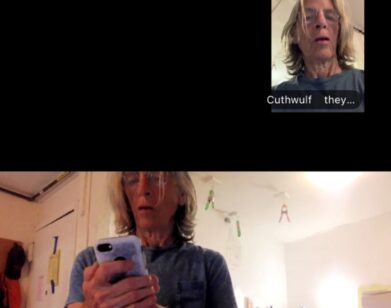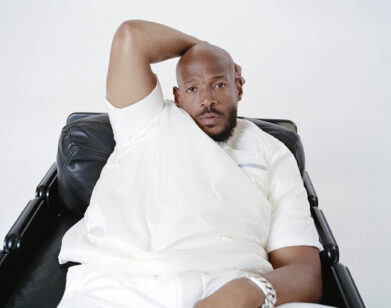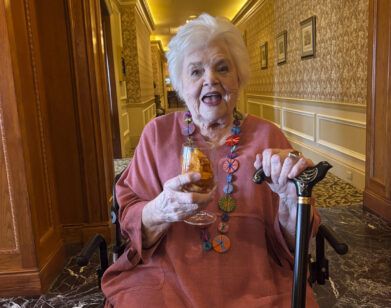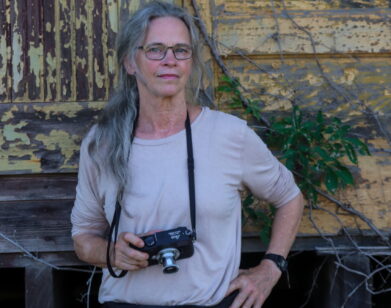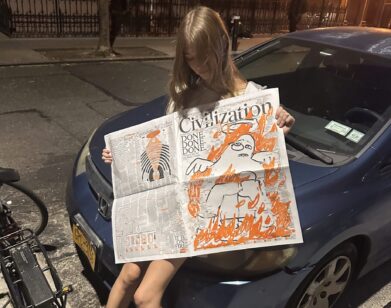David Hull and Kobi Libii Tell Us What They Really Want
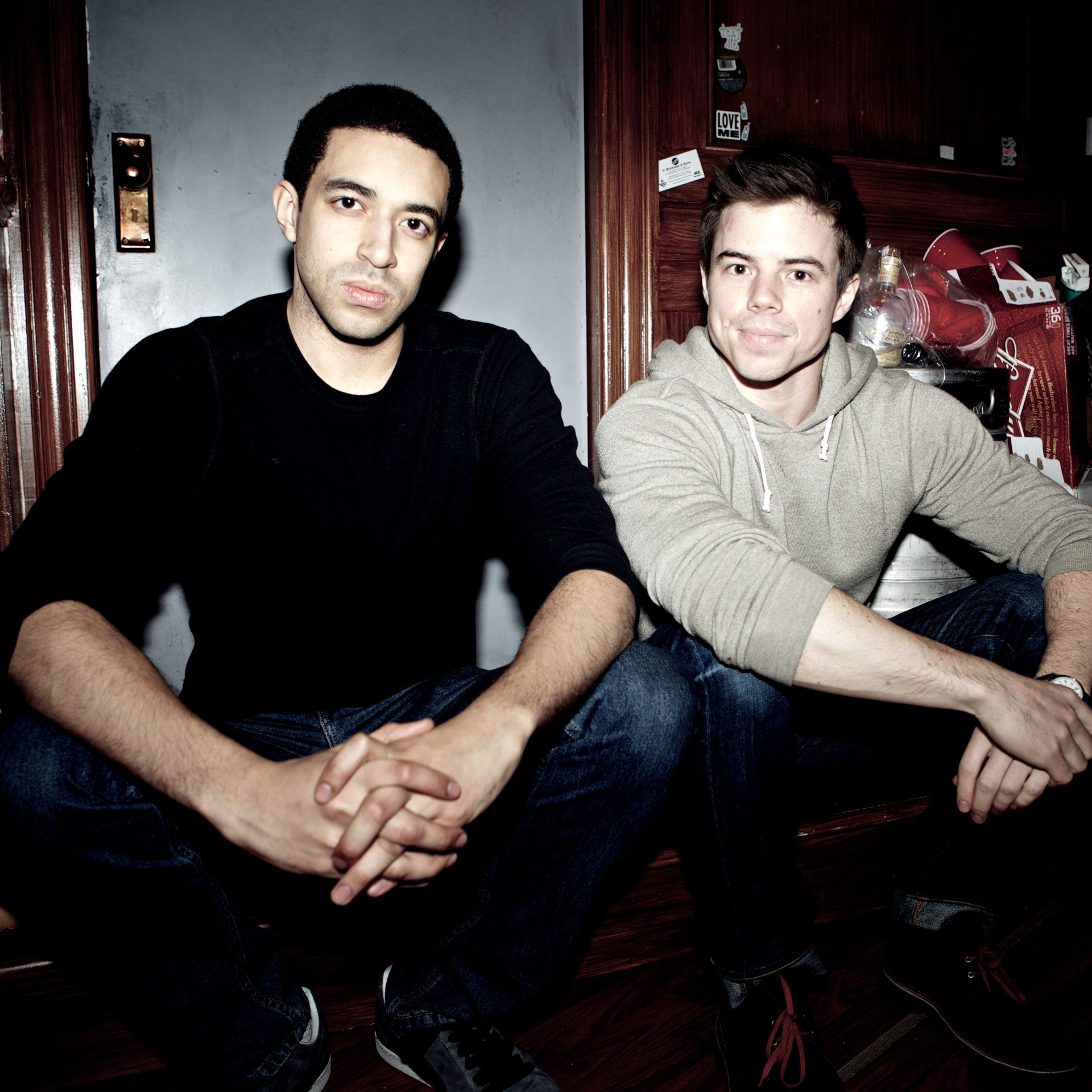
ABOVE: (LEFT TO RIGHT) KOBI LIBII AND DAVID HULL AT THE LUCILLE LORTEL THEATRE IN NEW YORK, FEBRUARY 2013. PHOTO BY FRANK SUN.
Broadway rarely reflects the present day. Between musicals and dialogue-heavy revivals, you could traipse from play to play and forget that cell phones, teenagers, the Internet, and club music exist. This is not the case in Paul Downs Colaizzo’s Really Really at the Lucille Lortel Theatre in the West Village.
Set at a present-day liberal arts college, home of “generation of me,” the lights go down and the dubstep turns on. It is the night after a particularly drunken party and each short scene reveals a new rumor about what happened the night before. The protagonists are a group of six senior friends: the pretty, poor, possibly promiscuous girl Leigh; her ambitious, strait-laced roommate Grace who attends biannual conferences for the “Future Leaders of America;” their juvenile and wealthy, frat-boy friends, the shirtless Cooper and handsome Davis; the clueless Jimmy; and the serious Johnson. The truth is in constant flux; you’re not sure who to believe, or if any of the characters even believe themselves.
After debuting in DC last year, this is Really Really‘s New York premiere. The actors involved come from myriad backgrounds; there are television actors Zosia Mamet (Girls) and Matt Lauria (Friday Night Lights), the Yale-trained, Second City alum, Kobi Libii, musical theater actor David Hull, and Lauren Culpepper, the only remaining member of the original DC cast.
We sat down with David Hull and Kobi Libii at the end of their last week of previews to talk about how far people will go to get what they really, really want and the last time they dropped their lines.
EMMA BROWN: How have the previews been going? Have you forgotten your lines yet?
KOBI LIBII: Oh, yeah. I forgot them last night.
DAVID HULL: There were changes made in the rehearsal room before we even made it to the theater, but after we go into the theater is when they really started to refine [the play]. They’re experiencing it with the audience, so they can tell what’s carrying the audience in the right direction, what’s distracting them, what’s funny, what’s not. We got our most significant changes this week—in our last week of previews. So last night was a little… [laughs]
LIBII: It was my fault! It was entirely my fault.
HULL: It was not your fault.
LIBII: It was one of those things where—
HULL: Ohh. That one was your fault. [laughs]
LIBII: Some little line got removed, and something about the way that changed the rhythm of the scene, the line that I was meant to go to next completely left my head. I said some version of the line that was changed three weeks ago—a line that I hadn’t said since January.
HULL: Never in front of an audience, for sure.
LIBII: David will handle it like a champion. It turns out he’s a great improviser. I’m an improviser, that’s a big part of what I do when I’m not doing scripted theater, and one of the first things I told him in the dressing room when we moved over here was, “I love improvising! I love it when I don’t know the rules and when we go off-script.”
HULL: He actually, I believe, said: “I would be much less nervous going downstairs right now if I didn’t have a script.”
LIBII: Something to that effect. And pretty much every time we’ve gone up on lines, I’ve been the one blubbering and David Hull over here has been the one jumping in with “I’ve got a line, don’t worry. Don’t you fear.” [laughs]
HULL: They never are very effective or make much sense, but I say something. [laughs]
BROWN: But your character doesn’t really need to make sense.
HULL: Not necessarily. That’s sort of sad. [laughs]
BROWN: Did you audition for your particular roles, Cooper and Johnson?
HULL: I was originally called in for Davis, but I had known Paul [Downs Colaizzo], the playwright, before this. He’s friends with my roommate. I had asked my roommate to read through the sides with me, the audition sides, and he was like, “I don’t think this is the part Paul wanted you to get called in for.” “Well, that’s the part I got called in for, so…” And so he texted Paul, and Paul called me not 30 seconds later and said “Do not come in for that part.” I actually made a bit of it, because [Davis] is supposed to be the statuesque, all-American hot boy—”forgive me for assuming that would be something I would be considered for… I don’t know how I was led to believe that.”
BROWN: How did you meet Paul, originally?
HULL: We just have mutual friends. I really got to know him through this process. I had auditioned several times.
BROWN: Was it weird auditioning for someone whom you’re kind of friends with, but not very good friends with?
HULL: No! He handled it very well. We all have friends who are behind the table in certain situations. I’ve had much more awkward audition situations with friends of mine. He was exceptionally friendly.
BROWN: Did he make you take off your shirt in the audition? You often don’t wear one in the play.
HULL: [laughs] No, that never entered the equation. Imagine my surprise when I don’t get to wear any clothes, all night! A couple of weeks after I was offered the part, David [Cromer], the director, got a hold of me, and was like, “Just so you know, clothing is going to be very optional. So if you’d like to get in better shape, I wouldn’t be mad at you.” [laughs] All right. Hint taken. You won’t even recognize me.
BROWN: How far do you think people will go to get what they want?
LIBII: I think it depends on how much they feel like they need it. Where we start judging people is when we feel that people are doing things, they’re taking actions to get what they want, that aren’t proportionate to how much they need that. Someone is selling a friend down the river for a piddling amount of money—we have judgment on that. But if people feel like their lives are in danger, their sense of self is being threatened, their worldview is under attack, there are few lengths that really seem too far. We start judging people when we feel there wasn’t as much under threat as they perceived to be.
HULL: I guess on paper it’s a lot easier to diagnose what is an appropriate response and what isn’t, but when you’re in those situations, when you’re the person that’s being most affected, your own judgment might be a little murky. You’re doing things that you perceive as not optional.
BROWN: Do you think that Cooper and Johnson are good friends to the people around them?
LIBII: I feel like Johnson is a good friend. I think he’s got a lot of resentment towards people who he considers his friends, and that’s what complicates things later in the play, but I do think he’s a good friend.
HULL: I think everybody is ultimately looking out for themselves. They can be as friendly as they need to be or want to be, but, at the end of the day, if their own sense of self is threatened they do what they need to get themselves back. I don’t know if that’s necessarily selfishness, that might just be how people function—they’re friends until they can’t be anymore to the people around them.
BROWN: One character, Grace, talks a lot about the characters in the play as part of this selfish “generation me,” which sounds very damning, but she also talks about the benefits of selfishness, and how it isn’t necessarily a bad thing. Do you think there’s any truth to what she says?
HULL: Absolutely. I think a theme of at least one of those speeches is that this is a generation of people who didn’t get what they were told they would get, and what we’ve inherited, we’ve had to find ways to use for our own mutual benefit. It’s not necessarily a downfall that people are so desperate to achieve something themselves, and it’s not necessarily a problem with society, it’s actually a testament to how adaptive our generation has been.
LIBII: I think it’s less characterizing us as broad-brush ambitious—[as] David said, a lot of what for other generations might have been seen as ambitions, were seen in our generation as promises, and that’s very dangerous. When we look at an economy like this, when we look at a world where things don’t work out, when we come of age and we realize some of the jagged edges that come with moving through the world, it can feel like you are the problem if you don’t get what you want. That’s a lot of what you see in this play, people feeling like they weren’t given what they were promised and thrashing around in response to that.
HULL: Ever since we were children, we were told: “You dream big enough and you can accomplish any goal, you work hard enough and anything can be within your sights, within your grasp.” Then you reach a certain age and you realize that’s not necessarily true and that you have to make do with what you have. And I think that that ability to adapt is kind of characteristic of the generation that wound up in a situation that wasn’t at all where they thought they’d be.
BROWN: But would you tell your children anything different?
LIBII: It’s a fine line. I think this is one of the challenges the play brings up in terms of parenting, there are no parents in the play, but there is a quiet criticism of the way we were raised—the way these particular individuals were raised. I think it’s a challenging question to determine what is the right amount of empowerment to give your children before it becomes arrogance, before it becomes ruthless.
BROWN: What was your biggest concern when you were in college?
HULL: Oh, man. College is the worst. [laughs] Mine was money, I think I can safely say. Which makes me having nothing in common with my character who just has no financial concerns. But I remember very vividly not having rent money, and racking up enormous amounts of debt. College is so expensive, and it’s crazy. Branching off of what we were just talking about, we were raised thinking that if you invest in college, if you work really hard and you go to a great school, you will have a great job. And that world doesn’t exist anymore.
BROWN: But when you decide to become an actor, do you still believe that you’ll definitely have a job when you graduate?
HULL: Oh, no. No, no, no. Acting’s a different situation.
LIBII: It is, but I think there’s a bit of delusion involved. There are just so many fewer jobs than there are actors, it’s a catastrophic problem—
HULL: But at least in school, they don’t pretend that that’s not true.
LIBII: That’s true, but I also think there’s a little part of every actor, no matter where they are in their career, that, from the bottom of their heart, really believes that they are going to get that job. Even though there may be 10 people who are exactly like them and of equivalent talents. You have to, to remain functional in that world. You have to live in that delusional world. It’s how we build things that are only lived in people’s imaginations, by having these crazy, audacious dreams.
HULL: We’re all nuts.
BROWN: What were your first professional acting gigs?
LIBII: I carried spears in a bunch of Shakespeare productions at Yale Rep. The first show that I was paid to do was King Lear, and basically whenever somebody died, I ran on stage and told everyone: “Oh, guys, somebody else died.”
BROWN: In that way?
LIBII: Yes, no verse. Just made up my own words.
HULL: [laughs]
LIBII: They loved me. They loved me. There’s a lot of death in that play, so I got to work a lot.
HULL: Yale. So fancy. So fancy over here. [laughs] My first job was when I was 16. I worked at a theme park outside of Cincinnati, Ohio and I sang pop and country revues and I was very good.
LIBII: [laughs]
HULL: It was embarrassing.
BROWN: Did anyone ever consider having you sing in this play?
HULL: No. Thank god.
BROWN: What’s your worst audition experience that you’re willing to share?
HULL: I had a good one, going in for Bernie Telsey, who’s the artistic director of this theater. I was singing—it had a very high last note and it was sort of an optional thing, you didn’t need to go all the way up, but I had it in the bag, I felt very confident. Sometimes in auditions, you’re like, Ugh, I’m not there today. I’m not going to do it. Then you get in there and you start singing and it feels great—I’ve got this. And I went for it, hard. And I fell. Hard. It was not good.
LIBII: [chuckles]
HULL: And Bernie, as soon as I stopped, goes: “Well, you tried.” [laughs] When they say, “It’s never as bad as you think it was,” that’s not true. It’s always just as bad as you thought it was.
LIBII: I’ve gone on exactly one dance audition.
HULL: Oh my god, what I wouldn’t pay…
LIBII: And it was a theater I’d worked with doing plays.
HULL: Yale Rep.
LIBII: They knew I was an actor. They were like, “Well, shit, the next play, it’s got a little dancing in it, but come on in. We like you. We think you’re talented.” So they jump me straight into the callback, I was going to come in one time, the director had seen me do stuff—”If he can dance, it’s his.” I have never left a room with more shame than I left that dance callback.
HULL: What kind of dancing are we talking about?
LIBII: It was African dancing. They were running it like a rehearsal—is that what they do on dance calls?
HULL: They just teach it.
LIBII: I just could not learn it. I could not learn it. “One, two, three, four, seven, eight, 10, 12—go!” And everyone was like, “I’ve witnessed it once. I can now do it.” And I was like, “I’m sorry, I need more time. Let me take this home and practice it in front of the mirror for three or four days, bring it back in. This is not fair! Who’s equipped to do this.” Dancers. Apparently dancers are equipped to do that.
BROWN: On your audition sheet, when you can list special skills, what do you put? Aside from singing and dancing…
LIBII: Well, I still put dancing. Fuck them. Fuck ’em.
HULL: Aren’t you an outrageous juggler?
LIBII: I’m not, that was a bit.
HULL: That was a bit? That was a good bit! It went on for a long time.
LIBII: I’ve just ruined this elaborate practical joke I was going to play. Thank you. The payoff would have been really satisfying. They would have found out I’m a shit juggler.
HULL: He once told us that that was a potential career option for him—juggling.
LIBII: I don’t know how this got started—then all of a sudden I was speaking as if I’d really considered being a professional juggler and there was a whole juggling circuit. There might very well be. If I’d thought it through, I would have brought you in on it, for sure.
REALLY REALLY IS NOW RUNNING AT THE LUCILLE LORTEL THEATRE IN NEW YORK. FOR MORE INFORMATION, OR TO PURCHASE TICKETS, VISIT THE MCC WEBSITE.

